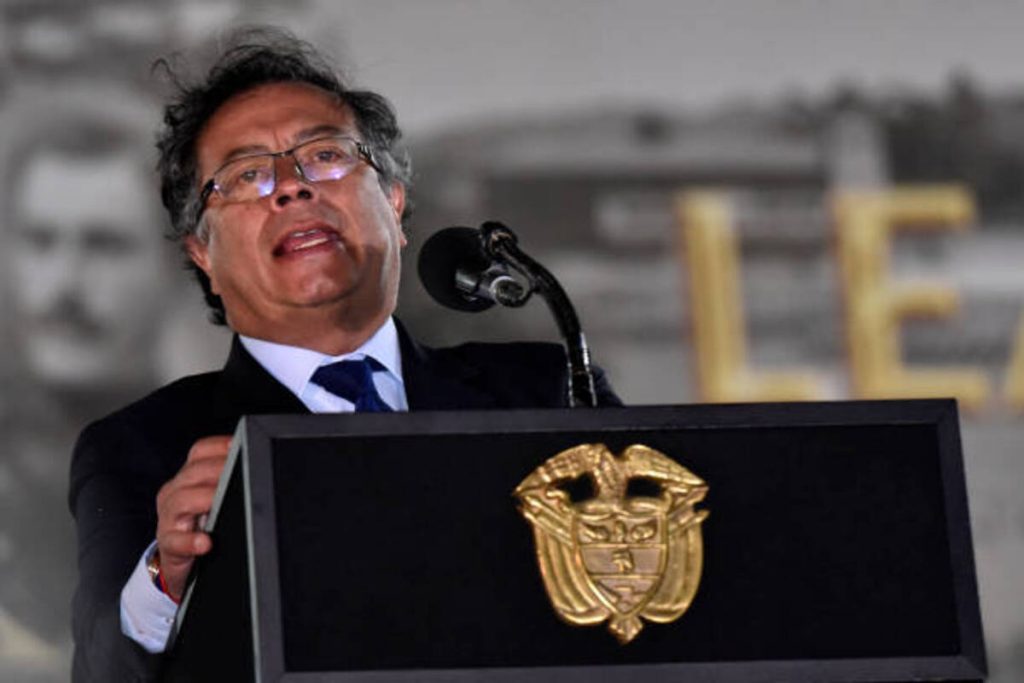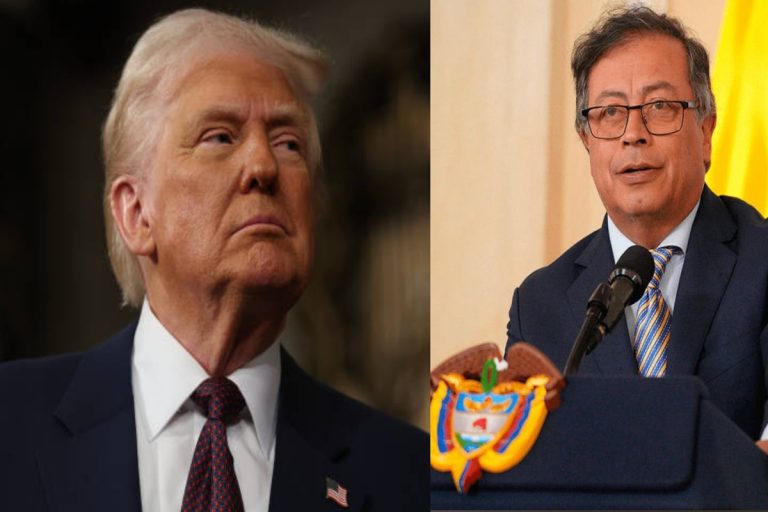
President Gustavo Petro speaks after presenting new military leadership at Escuela Militar de Cadetes General José María Córdova in August 20, 2022:. Guillermo Legaria Schweizer/Getty Images
Petro responded publicly, stating, “Trying to promote peace in Colombia is not being a drug trafficker.” He added that his policies have reduced violence and emphasized that his country continues to lose soldiers and police in the fight against cartels.
Petro rejects Trump’s allegations
Petro, according to independent international reports, wrote on social media that Trump had been misled by advisers and that he remains “the main enemy of drugs” in Colombia.
He accused the U.S. president of disrespecting the Colombian people and undermining diplomatic principles between allied nations.
Colombia’s Foreign Ministry later described Trump’s statement as a “direct threat to national sovereignty” and warned against “illegal intervention in Colombian territory.”
Defense Minister Pedro Sánchez said Colombia had used “all available capability” in its operations against drug trafficking and stressed that many Colombian security personnel had died during recent campaigns.
He said, “Our record speaks for itself. The Colombian government fights the drug trade daily, at great human cost.”
U.S. military strikes intensify regional friction
Shortly after Trump’s comments, U.S. Defense Secretary Pete Hegseth announced that American forces had struck a vessel allegedly carrying narcotics near Venezuela. He said the vessel was linked to Colombia’s National Liberation Army (ELN), a rebel group that has fought Petro’s government.
The U.S. Defense Department released a short video showing a boat engulfed in flames after an explosion. No evidence was presented to verify that the vessel carried drugs or was tied to Colombian insurgents.
Petro criticized the strike, saying it represented an unauthorized act of aggression. He claimed that one Colombian fisherman, Alejandro Carranza, was killed in a similar U.S. strike in September, describing the attack as an “assassination.”
“The United States has invaded our national territory, fired a missile to kill a humble fisherman, and destroyed his family,” Petro said. “This is Bolívar’s homeland, and they are murdering his children with bombs.”
Colombia seeks legal response
Petro said he had asked Colombia’s attorney general’s office to initiate international legal proceedings against the U.S. government. He added that the United States should respect Colombia’s internal affairs and withdraw any unauthorized operations.
Colombia’s government said the death of Carranza would be investigated as part of its duty to protect citizens from foreign aggression. Officials said that the victim’s boat appeared to have malfunctioned before it was struck.
Despite Petro’s criticism, Colombian prosecutors said they would pursue legal action against a survivor of another U.S. strike, claiming that evidence linked him to narcotics trafficking. An Ecuadorian national who survived a similar incident was repatriated and cleared of charges.
Strained U.S.–Colombia cooperation
The diplomatic dispute threatens to erode one of the strongest military and security alliances in Latin America. Colombia has been Washington’s primary partner in anti-narcotics efforts for decades, receiving billions in U.S. aid.
According to U.N. data, coca cultivation in Colombia reached record levels last year. Petro’s administration has promoted a strategy emphasizing crop substitution, rural development, and negotiated demobilization of armed groups rather than military eradication alone.
Trump’s administration has criticized this approach, arguing that it allows illegal cultivation to flourish. In September, Washington formally accused Colombia of failing to cooperate in the global drug war, though it temporarily waived sanctions that would have triggered aid cuts.
Petro said his policies prioritize human rights and social inclusion in rural communities that have historically depended on coca farming for survival. He said, “True peace cannot exist when poverty drives the drug economy.”
Experts warn of regional instability
Analysts say Trump’s decision to slash aid and launch strikes in the Caribbean could destabilize a region already facing rising tensions between Washington and Caracas. U.S. naval and air forces have been deployed to monitor what Trump has called an “armed conflict” with regional drug cartels.
Foreign policy experts warned that alienating Colombia could weaken joint operations targeting organized crime and undermine the fragile peace process with guerrilla factions that signed the 2016 peace accord.
One regional analyst said Washington risks “throwing away decades of security cooperation” with a vital partner. Another said that the U.S. posture could “empower rival powers seeking influence in Latin America.”
Petro’s government faces domestic pressure
Petro, Colombia’s first leftist president, has faced criticism at home for his stance toward Washington and his handling of the peace process. Opposition figures accuse him of jeopardizing Colombia’s alliance with the United States.
Petro’s supporters argue that he is standing up for national dignity and challenging what they see as Washington’s heavy-handed approach to the region. They say his administration continues to dismantle illegal drug networks while promoting economic reforms.
Trump’s comments have fueled nationalist sentiment in Colombia, where many citizens view U.S. military intervention as a violation of sovereignty. Several lawmakers in Bogotá have demanded that Colombia review defense cooperation agreements with Washington.
Colombian military cooperation under review
U.S. financial assistance to Colombia totaled about $230 million in the last fiscal year, a significant decrease from previous levels exceeding $700 million. Trump’s new directive could suspend the remainder of security and development funds for 2025.
Analysts said such a move would affect intelligence sharing, joint operations, and counterinsurgency support for Colombian forces. It could also slow rural stabilization projects and efforts to reintegrate former combatants.
Colombian defense officials said that while they value cooperation with the United States, they will not compromise national sovereignty. “We appreciate our partners,” one senior officer said, “but our constitution defines our independence.”
Washington has not commented on whether the aid suspension applies to humanitarian or counternarcotics programs already in progress.
Petro maintains diplomatic stance
Petro emphasized that he does not seek confrontation with the United States. He said Colombia remains open to dialogue, provided that it is “based on respect, not coercion.”
He added that his administration would continue cooperating on international drug policy through multilateral platforms, not unilateral dictates. “Colombia’s sovereignty is non-negotiable,” he said.
Diplomatic observers said Petro’s remarks aim to de-escalate tensions while asserting Colombia’s independence. However, the U.S. administration has not indicated any willingness to reverse its decision.
Both leaders have previously clashed over migration, tariffs, and U.S. military operations in Latin America, suggesting that bilateral relations could remain strained through the remainder of Trump’s term.
Regional allies express concern
Several Latin American governments have voiced unease about the growing rift between Bogotá and Washington. Neighboring countries say the dispute could disrupt security coordination and humanitarian aid flows across the region.
Diplomats in the region have urged restraint and renewed dialogue between the two leaders to prevent escalation.
Some warned that sustained U.S. strikes in regional waters could violate international maritime law.
Related: Machado’s Nobel Peace Prize spotlights Venezuela’s enduring fight for democracy and freedom
Petro’s government said it would continue reporting U.S. military actions to international organizations to ensure transparency and accountability.
As tensions persist, both leaders face domestic audiences expecting firm action. Trump continues to portray the drug trade as a national security threat, while Petro insists that social reform and sovereignty are Colombia’s priorities.
The standoff underscores the complexity of U.S.–Colombia relations and the evolving power dynamics in Latin America.



